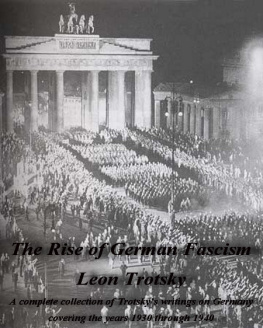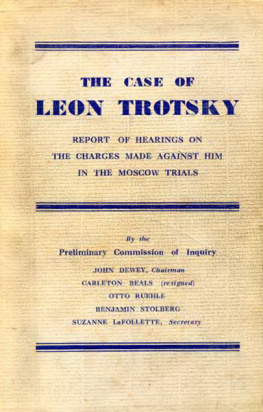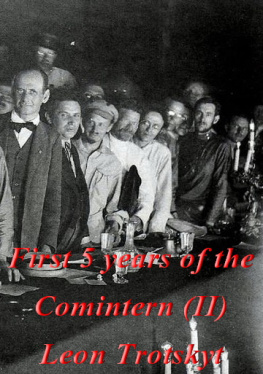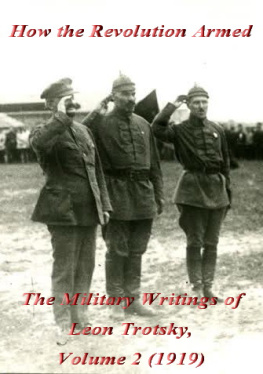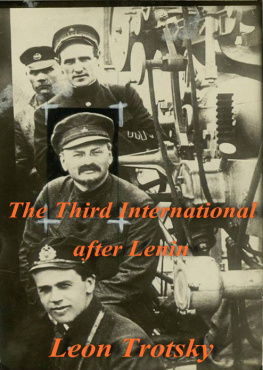The Turn in the Communist International and the Situation in Germany
Written in exile in Turkey, September 26, 1930.
Appeared in the Russian Bulletin of the Opposition, no.17-18, November-December 1930.
Published by the Communist League of America, October 1930.
Translation by Morris Lewitt.
Note: The nine paragraphs preceding the final three paragraphs werent translated in 1930 and were translated in 1971 for Pathfinder Press by Frank Manning and Gerry Foley.
Transcribed by Zodiac in 1994.
1. The Sources of the Latest Turn
Tactical turns, even wide ones, are absolutely unavoidable in our epoch. They are necessitated by the abrupt turns of the objective situation (a lack of stable international relations; sharp and irregular fluctuations of conjuncture; sharp reflections of the economic fluctuations in politics; the impulsiveness of the masses under the influence of a feeling of helplessness, etc., etc.). Careful observation of the changes in the objective situation is now a far more important and at the same time immeasurably more difficult task than it was before the war, in the epoch of the organic development of capitalism. The leadership of the party now finds itself in the position of someone who drives his automobile on a mountain, over the sharp zigzags of the road. An untimely turn, incorrectly applied speed, threaten the passengers and the car with the greatest danger, if not with destruction.
The leadership of the Communist International [1] in recent years has given us examples of very abrupt turns. The latest of them we have observed in the last months. What has called forth the turns of the Communist International since the death of Lenin? The changes in the objective situation? No. It can be said with confidence: beginning with 1923, not a single tactical turn was made in time, under the influence of correctly estimated changes in the objective conditions, by the Comintern. On the contrary: every turn was the result of the unbearable sharpening of the contradictions between the line of the Comintern and the objective situation. We are witnessing the very same thing this time, too.
The ninth plenum of the ECCI, the Sixth Congress, and particularly the tenth plenum, [2] adopted a course towards an abrupt and direct revolutionary rise (the third period), which was absolutely excluded at the time by the objective situation existing after the great defeats in Britain and China, the weakening of the Communist parties throughout the world, and particularly under the conditions of a commercial and industrial boom, which embraced a series of the most important capitalist countries. The tactical turn in the Communist International begun in February 1928 was therefore directly contrary to the actual turn of the historic road. From these contradictions arose the tendencies of adventurism, the further isolation of the parties from the masses, the weakening of the organizations, etc. Only after all these phenomena had clearly assumed a menacing character did the leadership of the Comintern make a new turn in February 1930, backward from, and to the right of, the tactics of the third period.
It is the irony of fate, unmerciful to all chvostism, [Tailism the theory/practice of following behind events.] that the new tactical turn in the Comintern coincided chronologically with the new turn in the objective conditions. An international crisis of unprecedented acuteness undoubtedly opened the prospect of mass radicalization and social convulsions. Precisely under such circumstances, a turn to the left could and should have been made, that is, boldly speeding up on the curve of the revolutionary upsurge. This would have been absolutely correct and necessary if, in the last three years, the leadership of the Comintern had utilized, as it should have, the period of economic revival and revolutionary ebb to strengthen the positions of the party in the mass organizations, above all in the trade unions. Under such circumstances, the driver could and should have shifted his gears in 1930 from second into third, or at least prepared for such a change in the near future. In reality, the directly opposite process took place. So as not to go over the cliff, the driver had to change from a prematurely adopted speed down to second and slow down the pace. When? Under circumstances in which a correct strategic line would have demanded acceleration.
Such is the crying contradiction between tactical necessity and strategic perspective, a contradiction in which, by the logic of the mistakes of their leadership, the Communist parties find themselves in a number of countries.
We see this contradiction most strikingly and dangerously now in Germany, where the last elections revealed an exceptionary peculiar relation of forces, resulting not only from the two periods of Germanys postwar stabilization, but also from the three periods of the Cominterns mistakes.
2. The Parliamentary Victory of the Communist Party in the Light of the Revolutionary Tasks
The official press of the Comintern is now depicting the results of the German elections as a prodigious victory of Communism, which places the slogan of a Soviet Germany on the order of the day. The bureaucratic optimists do not want to reflect upon the meaning of the relationship of forces which is disclosed by the election statistics. They examine the figure of Communist votes gained independently of the revolutionary tasks created by the situation and the obstacles it sets up.
The Communist Party received around 4,600,000 votes as against 3,300,000 in 1928. From the viewpoint of normal parliamentary mechanics, the gain of 1,300,000 votes is considerable even if we take into consideration the rise in the total number of voters. But the gain of the party pales completely beside the leap of fascism from 800,000 to 6,400,000 votes. Of no less significance for evaluating the elections is the fact that the Social Democracy, in spite of substantial losses, retained its basic cadres and still received a considerably greater number of workers votes than the Communist Party.
Meanwhile, if we should ask ourselves what combination of international and domestic circumstances could be capable of turning the working class towards Communism with greater velocity, we could not find an example of more favorable circumstances for such a turn than the situation in present-day Germany: Youngs noose, [3] the economic crisis, the disintegration of the rulers, the crisis of parliamentarism, the terrific self-exposure of the Social Democracy in power. From the viewpoint of these concrete historical circumstances, the specific gravity of the German Communist Party in the social life of the country, in spite of the gain of 1,300,000 votes, remains proportionately small.
The weakness of the positions of Communism, inextricably bound up with the policy and regime of the Comintern, is revealed more clearly if we compare the present social weight of the Communist Party with those concrete and unpostponable tasks which the present historical circumstances put before it.
It is true that the Communist Party itself did not expect such a gain. But this proves that under the blows of mistakes and defeats, the leadership of the Communist parties has become unaccustomed to big aims and perspectives. If yesterday it underestimated its own possibilities, then today it once more underestimates the difficulties. In this way, one danger is multiplied by another.
In the meantime, the first characteristic of a real revolutionary party is to be able to look reality in the face.
3. The Vacillations of the Big Bourgeoisie
With every turn of the historic road, with every social crisis, we must over and over again examine the question of the mutual relations of the three classes in modern society: the big bourgeoisie, led by finance capital; the petty bourgeoisie, vacillating between the basic camps; and finally, the proletariat The big bourgeoisie, making up a negligible part of the nation, cannot hold power without the support of the petty bourgeoisie of the city and the village, that is, of the remnants of the old, and the masses of the new, middle classes. In the present epoch, this support acquires two basic forms, politically antagonistic to each other but historically supplementary: Social Democracy and fascism. In the person of the Social Democracy, the petty bourgeoisie, which follows finance capital, leads behind it millions of workers.

